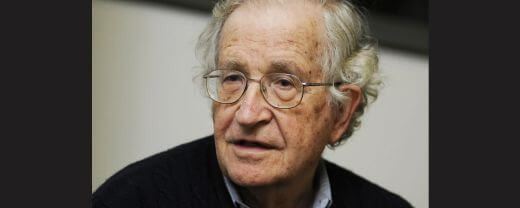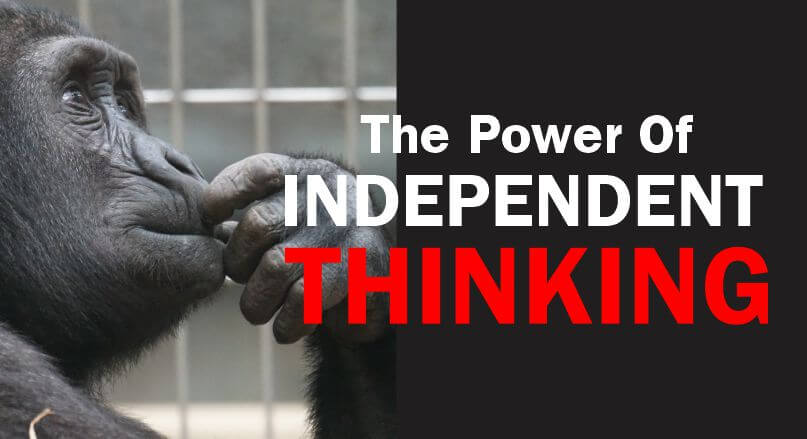Last updated on October 6th, 2023 at 10:36 pm
Independent thinking is an important skill that is valued in many different fields as it allows you to make informed decisions and solve complex problems.
Every task we engage in everyday living involves thoughts, and it’s in our thoughts we build decisions that affect our lives positively or negatively.
In a world that is continuously evolving, having the ability to think independently and analyse information objectively without being influenced by personal biases, beliefs or emotions is invaluable.
The essence of this article is to present clearly, the concept of independent thinking also interchanged with critical thinking or autonomous thinking, its characteristics, benefits, challenges, and strategies to develop it.
Feel free to use the table of contents to navigate to your preferred subtopic.
Table of Contents
- Independent Thinking Definition
- Types of Independent Thinking
- Characteristics and Independent Thinker Traits
- Examples of Independent Thinkers in History
- The Benefits of Independent Thinking
- The Challenges of Independent Thinking
- Breaking Free: Strategies for Developing Autonomous Thinking
- Conclusion
Independent Thinking Definition

The majority of us are wired to think casually by default, allowing our feelings and emotions to influence how we analyse information and situations.
That’s complacent…
Independent thinking, on the other hand, is the ability to analyze, evaluate, and combine information to form judgments and decisions that make good sense without the interference of personal opinion or feelings.
This means you are having free and fair thinking, focusing on the purity of the result and not what you want the result to be.
Yes! You might desire a particular outcome from a situation and forego many bits of the process which leads to a flawed result.
Thinking independently scrutinizes all the crannies for a detailed flawless result.
Related: The 5 Pillars Of Life: The Secrets To Your Well-being
It takes discipline to be able to do all of that without lacing the process with personal assumptions.
In achieving this, different perspectives are examined to isolate assumptions and biases before reaching a logical conclusion hinging on evidence and facts.
Autonomous thinking requires a level of intellectual curiosity, open-mindedness, and a willingness to question one’s own assumptions and beliefs.
It is a key skill in many areas of life, including academic and professional pursuits, personal decision-making, and effective communication.
Types of Independent Thinking
Here are the various types:
- Critical thinking: This involves analyzing and evaluating information to identify biases, assumptions, and inconsistencies in arguments. Individuals with strong critical thinking skills can assess the strength of an argument and make sound judgments.
- Creative thinking: This has to do with generating new ideas or ways of looking at existing ideas. Creative thinkers are able to think outside of the box and come up with unique solutions to problems.
- Reflective thinking: This involves examining your own thoughts and behaviors and evaluating their impact. Reflective thinkers use self-awareness and introspection to improve their decision-making abilities.
- Strategic thinking: This has to do with evaluating options and making decisions based on long-term goals. Strategic thinkers are able to consider multiple outcomes and anticipate the future consequences of their decisions.
- Metacognitive thinking: This involves awareness of your own thought processes and strategies for self-directed learning. Individuals who engage in metacognitive thinking are able to reflect on how they learn and make adjustments to improve their learning and problem-solving abilities.
Related: Cultivating Individuality and Selfhood
Characteristics and Independent Thinker Traits

Individuals who think independently have the following characteristics:
1. Being Curious and Asking Questions
I enjoy the sight of kids being fascinated by a new toy and they are eager to find their way around it to see how it works.
You see the stimulation of intellect, curiosity, and the need to seek assistance if they fail on their own.
Curiosity and asking questions are essential characteristics of autonomous thinking because they demonstrate an individual’s desire to learn and understand the world around them.
Independent thinkers are not satisfied with the average belief, or explanations, they want more answers beyond the status quo.
That is why they seek out new information from multiple sources to have a broader view of a situation that will inform their own opinion.
2. Being Open-minded and Unbiased
Being open-minded and unbiased means being receptive to the ideas and thoughts of others without letting personal biases or preconceived notions hinder our judgment.
You are ready to receive new information and change your opinions if the evidence is good.
Open-mindedness can entertain new ideas, without feeling threatened or defensive.
This helps to avoid being stuck in rigid thinking patterns and allows us to continuously learn and grow intellectually.
I remember when I was called up for an evaluation of a situation that required many people from different ethnic groups to collaborate and find a solution.
Related: How To Escape The Rat Race And Create The Life You Want
Some people couldn’t work with others because of their preconceived notions of them. They had prejudices that were hinged on past experiences.
The project suffered a setback as a result of this.
Independent thinkers live above biases and prejudices, ethnic bigotry, and tribalism, they filter information from any source, take what is needed, and discard what is not.
By being open-minded and unbiased, you are more likely to weigh evidence equally, without being swayed by personal beliefs or opinions, but on merits.
3. Being Analytical and Critical
Analytical somehow is a big word, and when it is thrown around, people don’t really understand it thoroughly even when they have a dictionary.
Being analytical simply means breaking down problems into smaller bits so they can easily be handled independently for clear understanding and interpretation.
This is achieved by treating each part separately and independently.
Analytical thinking allows independent thinkers to recognise patterns, inconsistencies, and relationships between information which aids problem-solving.
Also Read: Breaking Free: The Power of Independent Thinking
4. Being Self-aware and Introspective
Being self-aware and introspective is a characteristic of independent thinking. It involves the ability to reflect on one’s own thoughts, beliefs, and behaviors.
I used to make a joke about metacognition, which is thinking about my own thinking.
When you are well aware of your thought patterns, you identify prejudices and blind spots which are capable of hindering effective independent thinking.
By being self-aware and introspective, you can challenge your own thinking, consider different perspectives, and make decisions based on sound reasoning rather than face value or first-layer information.
5. Being Confident
Confidence plays a significant role in the decision-making process of an independent thinker.
When making decisions, independent thinker relies on their own judgment and intuition, and they are confident in their ability to do so.
They do not seek validation from others or rely on external sources to confirm their beliefs or opinions.
Additionally, confidence enables independent thinkers to take risks and pursue their goals without fear of failure.
They are willing to challenge the status quo and explore new ideas and perspectives, even if it means going against popular opinion.
Related: Fear Propaganda: How It is Used For Psychological Manipulations
6. Being Focused
When an independent thinker is focused, they are able to concentrate on the task at hand and approach it with a clear and logical mind.
They do not let outside influences or distractions sway their thoughts or decisions. Instead, they stay committed to their goals and are able to see them through to completion.
Additionally, autonomous thinkers often have a strong sense of purpose and direction, which helps them to maintain their focus.
They know what they want to achieve and are able to stay on track, even when faced with obstacles or challenges.
7. Being Flexible
Flexibility is an important characteristic of autonomous thinkers because it allows them to approach problems and situations with an open mind and willingness to explore different options.
They are able to consider alternative solutions and approaches and are not afraid to change their minds or revise their thinking if new information or evidence emerges.
Related: The Role of Cognitive Intuition in Creative Thinking
In contrast, rigid thinking can limit a person’s ability to consider different perspectives and make it harder to adapt to changing circumstances.
Autonomous thinkers who are flexible are able to navigate complex situations and make informed decisions, even in the face of uncertainty or ambiguity.
8. Independence
Independent thinkers are able to overcome setbacks and obstacles to achieve their goals.
They are self-reliant and able to make decisions without relying on others.
9. Resilience
Independent thinkers are able to overcome setbacks and obstacles to achieve their goals.
Examples of Independent Thinkers in History
There have been in history, numerous thinkers who were independent in their thoughts and achievements. I have carefully selected these ancient and modern thinkers as examples of what we have been explaining:
Ancient Independent Thinkers

- Socrates: Socrates was an independent thinker because his philosophy and methods of inquiry were not influenced by traditional schools of thought in Athens. He did not align himself with any particular group or individual, and his teachings were often at odds with the prevailing beliefs and customs of his time. Socrates believed that knowledge came from questioning and examining one’s own beliefs and assumptions, rather than relying on authority or conventional wisdom. Socrates’ commitment to independent thinking led to his famous statement that “The unexamined life is not worth living.”

- Pythagoras: It is widely believed that Pythagoras was an autonomous thinker because he challenged the prevailing ideas of his time and pursued his own philosophical and mathematical theories. He is credited with the discovery of the Pythagorean theorem, which was a significant contribution to the field of geometry. Additionally, his teachings on philosophy, morality, and spirituality were unique and different from the prevailing beliefs of his time, which some scholars believe demonstrate his independence of thought.

- Cicero: Cicero can be considered an autonomous thinker because he did not blindly follow the teachings of any particular school of philosophy. He was well-versed in various schools of thought, including Stoicism, Epicureanism, and Academic skepticism, and he incorporated elements of each into his own philosophy. Cicero was known for his emphasis on individualism and his belief in the importance of ethics and moral responsibility. Cicero’s thought was marked by his willingness to challenge established ideas and his commitment to finding the truth through logical analysis and critical thinking.

- Marcus Aurelius: Marcus Aurelius was an independent thinker because he did not conform to the expectations of his time or follow the mainstream philosophical school of his era. Instead, he developed his philosophical ideas based on his observations and experiences. He was known for his Stoic beliefs and wrote extensively about self-reflection, accepting the impermanence of life, and maintaining a virtuous character.
Modern Independent Thinkers

- Noam Chomsky: Noam Chomsky is regarded as an independent thinker due to his critical insights and original ideas on language, cognition, politics, and social issues. Chomsky’s groundbreaking theories on language acquisition, syntax, and generative grammar revolutionized the field of linguistics and challenged the prevailing behaviorist and empiricist paradigms. Photo Credit: Britannica.

- Jordan Peterson: Jordan Peterson was an independent thinker because he challenged the status quo and popular opinions on a range of topics including gender, politics, religion, and education. He based his views on his extensive research and personal experiences, rather than blindly accepting what others believed to be true. Peterson also brought attention to controversial issues such as the suppression of free speech and the dangers of radical ideologies.

- Yuval Noah Harari: Yuval Noah Harari was an autonomous thinker in many ways. He challenged conventional wisdom and traditional views of history and humanity, taking a broad perspective that combined anthropology, biology, and economics. Harari was not bound by the constraints of traditional academic disciplines but instead followed his curiosity wherever it led him. This led him to write books like “Sapiens” and “Homo Deus,” which offer an unconventional take on the history of the human species and our potential future. Photo Credit: Wikipedia.

- Angela Davis: Angela Davis was an autonomous mind because she always prioritized her own values, ideas, and convictions over outside pressure or influence. She was committed to speaking her own truth, even if it meant challenging deeply entrenched systems of power and privilege. Davis was committed to pursuing her own intellectual interests, despite facing a great deal of criticism and backlash from mainstream academia. Photo Credit: Wikipedia.
The Benefits of Independent Thinking
There are many benefits of thinking independently both in professional and personal life. They are as follows:
1. Improved Decision-making
By approaching problems with an open mind and analytically, you can make the right decisions that are logical and reason-based instead of emotional and biased.
This helps to ensure that decisions are well thought out and rational, rather than based on assumptions or beliefs that may not be accurate.
The ability to make better decisions is a key benefit of independent thinking, helping individuals to achieve greater success and fulfillment in both their personal and professional lives.
Related: The Importance of Personality In Career Choices
2. Increased Creativity and Innovation
Analytical thinkers are not afraid to challenge the status quo or conventional wisdom, making them more likely to come up with fresh and innovative solutions to problems.
They are able to break free from the constraints of traditional thinking and are able to approach problems from new and different angles, often leading to unique and unexpected solutions.
Also, they tend to be more adaptable, willing to embrace change and take risks to explore new opportunities, making them excellent innovators.
Ultimately, independent thinking fosters a culture of creativity and innovation, encouraging people to push boundaries and push towards greater success.
3. Enhanced Problem-solving Skills
Lateral thinking can lead to creative and innovative solutions to problems that might not have been reached through conventional thinking.
Also, as a critical thinker, you are skilled at analyzing complex situations and breaking them down into smaller, more manageable pieces.
This allows you to identify the root cause of a problem and develop effective solutions that address the underlying issues rather than just treating symptoms.
Related: The Hidden Power Of Intuition: Discovering Your Inner Wisdom
Additionally, you are able to view problems from multiple perspectives and consider a variety of possible outcomes.
Uncertainty does not scare you because you are willing to take risks to achieve your goals.
All of these skills combined make independent thinkers excellent problem-solvers, which can benefit them in both their personal and professional lives.
4. Improved Communication Skills
Improved communication skills are a benefit of independent thinking because when someone it enhances clear and concise ideas and thoughts about the task at hand.
This clarity of thought leads to effective and efficient communication with others.
As an analytical thinker, you are more open to considering other viewpoints and perspectives, which enables you to engage in meaningful dialogue and have productive discussions with others.
Also, you are able to express your ideas and opinions in a way that is respectful and considerate of others, creating a positive and collaborative environment.
5. Increased Self-awareness and Personal Growth
Thinking independently can lead to increased self-awareness and personal growth because it requires you to challenge the traditional beliefs and values, as you have come to know them.
It propels you to seek more knowledge and clarity beyond the opinions of others.
When you engage in autonomous thinking and critically analyze your own ideas and beliefs, you gain a deeper understanding of yourself and your motivations.
This insight can lead to greater self-confidence, self-awareness, and a stronger sense of personal purpose.
Thinking laterally can also lead to personal growth because it encourages you to take responsibility for your own actions and decisions.
By thinking for yourself, you can create your own paths in life and pursue your own goals and aspirations.
This process can be challenging at times, but it can also be incredibly rewarding as you learn to trust your own judgment and take ownership of your life.
The Challenges of Independent Thinking
Just like every other path to a positive experience in life, there are challenges. Here are the challenges you will face as an independent thinker:
1. Resistance from Others
Resistance from others can be one of the greatest challenges to lateral thinking.
People can be resistant for different reasons; they might be opposed to change, threatened by new ideas, or simply uninterested.
When someone is resistant to your ideas, it can be tempting to water down your thinking or give up altogether.
But if you truly believe in your ideas, it’s important to remain firm and maintain your autonomous thinking.
In such a case, it’s important to gather evidence to support your ideas, articulate your points clearly, and communicate effectively.
Related: Insatiable Curiosity: Unleashing Your Inner Explorer
It might be helpful to seek out other individuals or communities who share a similar interest or perspective.
This can provide support, and helpful feedback and help you find others who can help you challenge your thinking in a constructive manner.
Additionally, it’s important to be open to feedback and constructive criticism from those who may resist your ideas, as it can provide new insights and help you refine your thinking.
2. Difficulty in Questioning Your Own Beliefs
The ability to question your beliefs is a critical component of independent thinking.
It requires the willingness to challenge your own assumptions and biases and objectively assess whether they are valid or not.
However, it can be difficult to question your own beliefs because doing so may lead to uncomfortable realizations and require changes in behavior or attitudes.
People often develop beliefs based on their personal experiences, cultural upbringing, and social environment.
These beliefs are often intertwined with their sense of identity and can be deeply ingrained.
As a result, questioning these beliefs can be challenging and may require individuals to confront their sense of self.
Also, questioning your own beliefs may require a significant amount of effort and critical thinking.
It requires you to consider alternative viewpoints, evaluate evidence objectively, and acknowledge your own cognitive biases.
3. Fear of Being Wrong
The fear of being wrong is a mental barrier that prevents you from engaging in independent thinking.
It is a challenge because it can limit your ability to critically analyze and question what you already know.
This fear can lead to conformity and groupthink, where individuals avoid expressing their own opinions for fear of being judged or rejected by others.
Autonomous thinking requires you to have the courage to challenge the established norm, think outside the box, and be willing to take risks.
This means accepting that there is no guarantee of being right and that making mistakes is part of the learning process.
However, the fear of being wrong can prevent you from taking these risks, leading to a narrow-minded view of the world and a lack of creativity in problem-solving.
To overcome this challenge, it is important for you to recognize that being wrong is not a failure, but rather an opportunity for growth and learning.
4. Overthinking and Analysis Paralysis
Overthinking and analysis paralysis are two challenges that can hinder analytical thinking.
It involves getting lost in thought and obsessing over details or scenarios, which can lead to inaction and indecision.
It can lead to getting stuck and not making any progress in making decisions or taking action.
Analysis paralysis is a similar challenge that can arise when attempting to make a decision.
This occurs when you spend so much time analyzing various options that you become paralyzed and unable to make a decision.
This can be a result of fear of making the wrong choice, fear of failure, or a desire for perfection.
Both of these challenges can hinder analytical thinking because they limit your ability to trust your instincts and make informed decisions.
Instead of relying on your own knowledge and experiences, you get lost in your thoughts and become paralyzed by indecision.
To overcome these challenges, it is important to learn how to recognize when you are overthinking or experiencing analysis paralysis and take steps to address it.
Breaking Free: Strategies for Developing Autonomous Thinking
Here are different steps you can take to develop your ability to think independently:
1. Cultivate Curiosity
Cultivating curiosity is the act of developing a keen interest or desire for knowledge through natural inquisitiveness.
By asking questions, seeking information, exploring new ideas, and being open to different perspectives, you can develop a curiosity that can lead to independent thinking.
When you cultivate curiosity, you develop a habit of questioning things and applying critical thinking to different situations.
This promotes autonomous thinking, as you are always asking yourself why things are the way they are and seeking answers to these questions.
You become less reliant on external sources of information, as you are continually seeking out new knowledge and developing your own understanding of the world.
By developing autonomous thinking, you become less influenced by societal norms and expectations, allowing you to think for yourself and make informed decisions.
This can lead to increased creativity, innovation, and problem-solving skills, as you are not limited by conventional thinking or predetermined ideas.
2. Practice Critical Thinking
Practicing critical thinking is a way to develop autonomous thinking as it involves analyzing and evaluating information in a way that is not influenced by biases or preconceived ideas.
Critical thinking requires you to ask questions, consider multiple perspectives, and weigh different arguments before forming an opinion or making a decision.
By practicing critical thinking, you can learn to think for yourself and become less reliant on outside sources for guidance.
This can help you develop confidence in your own abilities to make decisions and analyze information, ultimately leading to greater independence in your thinking.
3. Engage with Diverse Perspectives
Engaging with diverse perspectives means seeking out and actively considering the ideas, opinions, and experiences of people who have different backgrounds, beliefs, and perspectives than oneself.
This practice can help to develop independent thinking by exposing you to alternative viewpoints and challenging the assumptions and biases that inform your own thinking.
Ultimately, engaging with diverse perspectives can enable you to form your own independent judgments and opinions based on a well-rounded understanding of multiple viewpoints, rather than relying solely on your own limited experiences and assumptions.
4. Challenge your own Beliefs
Developing independent thinking is all about thinking for oneself, and questioning one’s own beliefs is a crucial part of this process.
When you challenge your own beliefs, you open yourself up to new ideas and different perspectives.
You become more aware of your biases and prejudices, and you learn to think more objectively, become better at separating fact from fiction, and make informed judgments.
By challenging your own beliefs, you also become more confident in your opinions.
When you are subjected to rigorous examination, you can be more certain that your beliefs are grounded in reason and evidence.
At the same time, you are more open to changing your mind if you encounter new information that challenges your beliefs.
5. Seek Feedback and Input from others
Seeking feedback and input from others is a process that can be extremely beneficial for developing independent thinking.
When you approach others for feedback, you are exposing yourself to other perspectives, approaches, and ideas that you may not have previously considered.
By actively listening to what others have to say and considering their viewpoints, you can gain a broader understanding of the topic or issue at hand.
As you receive feedback and input, you can begin to assess the information you receive against your own ideas and beliefs.
Related: Power Dynamics: Understanding The Complexities Of Interpersonal Relationships
You may find that some feedback resonates with you, while other ideas do not.
This process allows you to begin to discern which ideas you agree with and which ideas you do not, ultimately fostering independent thinking.
In addition, seeking feedback and input from others allows you to test your own ideas and assumptions.
By presenting your ideas to others, you invite them to critique and question your thinking, which can help you identify weak points or gaps in your arguments.
This process challenges you to defend your ideas and consider alternate viewpoints, further strengthening your independent thinking.
6. Embrace Failure and Learn from it
Embracing failure means accepting that mistakes and setbacks are a natural part of the learning and development process.
It involves reframing failure as an opportunity for growth and improvement rather than a negative experience to be avoided at all costs.
By approaching failure with an open and curious mindset, you can develop independent thinking skills that allow you to learn from your mistakes and apply that knowledge to future challenges.
Learning from failure requires a willingness to reflect on what went wrong, identify opportunities for improvement, and take action to address any gaps in knowledge or skills.
Independent thinking is necessary for this process because it involves the ability to analyze situations objectively, without being influenced by external pressures or biases.
By cultivating this mindset, you can learn to view failure as a valuable learning experience rather than a personal failure.
Conclusion
Independent thinking is a critical skill that offers numerous benefits to individuals and society as a whole.
Developing this skill requires practice, courage, and a willingness to challenge the status quo.
The benefits of independent thinking range from increased creativity and innovation to a greater sense of personal responsibility and accountability.
While the challenges of independent thinking may include pushing against social norms and facing opposition or resistance, the long-term benefits are worth the effort.
Strategies for developing this skill include cultivating curiosity, critical thinking, and the ability to weigh evidence objectively.
Ultimately, independent thinking empowers individuals to make informed decisions and contribute positively to society.
Frequently Asked Questions
What is independent thinking?
It is the ability to analyze and evaluate information without being influenced by external factors such as peer pressure or biases. It involves critical thinking, reasoning, and problem-solving skills.
How can I develop my independent thinking skills?
You can develop your analytical thinking skills by practicing critical thinking, analyzing and evaluating facts and evidence, listening to different perspectives, questioning assumptions, and staying open-minded.
Why is independent thinking important?
It is important because it allows individuals to make informed and rational decisions, solve complex problems, and pursue their goals effectively without outside influence.
What is the difference between independent thinking and critical thinking?
It involves making decisions without being influenced by external factors, while critical thinking involves analyzing and evaluating information to make informed decisions.
Can independent thinking be taught?
Yes, it can be taught through education, training, and practice. It requires developing skills, such as critical thinking and analysis, and encouraging individuals to question assumptions and beliefs.
How can I apply independent thinking in my daily life?
You can apply independent thinking in your daily life by questioning assumptions, analyzing information, seeking out different perspectives, making informed decisions, and staying open-minded.
What are the benefits of independent thinking?
The benefits of independent thinking include making informed and rational decisions, solving complex problems, pursuing goals effectively, avoiding biases and prejudices, and fostering personal growth and development.
REFERENCES
- Autonomous Thinking: 7 Tips On Becoming An Individual Thinker
- Truly Independent Thinkers Have These 5 Traits
- 10 things that analytical thinkers always do (but never talk about)
- 5 Ways to Build the Independent Thinking Skill
Pyo Merez (PsyD) is a distinguished adolescent and adult psychologist at the forefront of mental health advocacy.
With expertise in cognitive and developmental psychology, focusing on social relationships, cultural contexts, and individual differences, Pyo has dedicated his career to empowering adolescents and adults.
As a sought-after speaker and panelist, Pyo shares invaluable insights on issues affecting young people, contributing to a deeper understanding of mental health and well-being in today's society.


